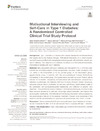Identificador persistente para citar o vincular este elemento:
https://accedacris.ulpgc.es/jspui/handle/10553/77024
| Título: | Motivational Interviewing and Self-Care in Type 1 Diabetes: A Randomized Controlled Clinical Trial Study Protocol | Autores/as: | Alvarado Martel, Dácil Boronat Cortés, Mauro Alberiche Ruano, Maria Del Pino Algara González, María Andrea Ramallo Fariña, Yolanda Wägner, Anna Maria Claudia |
Clasificación UNESCO: | 32 Ciencias médicas 320502 Endocrinología |
Palabras clave: | Adherence Health Related Quality Of Life Motivational Interviewing Randomised Controlled Trial Self-Care, et al. |
Fecha de publicación: | 2020 | Publicación seriada: | Frontiers in Endocrinology | Resumen: | Background: Type 1 diabetes is a disease with complex therapeutic recommendations that require day-to-day lifestyle changes. Motivational Interviewing is a communication tool that has proved effective in changing behaviors in people with addictions, obesity and type 2 diabetes. Our objective is to evaluate the effects of a Motivational Interviewing intervention in people with type 1 diabetes. Methods: Sixty-six patients with type 1 diabetes and hemoglobin A1c >= 8% have been included and randomly assigned (computer-generated sequence, sealed envelopes, ratio 1:1) either to the intervention or to the control group. In the intervention group, appointments every 4 months with the endocrinologist include Motivational Interviewing; in the control group, the appointments proceed as usual. Patients will be followed for 16 months. The primary outcome will be self-care behaviors, assessed by a validated questionnaire, the Diabetes Self-Care Inventory-Revised Version. Secondary outcomes include: HbA1c, motivation for self-care, self-efficacy, health-related quality of life, satisfaction with professional-patient relationship, and fulfillment of patients’ own objectives. The practitioners receive training in Motivational Interviewing in order to help them promote adherence to self-care, encourage patient motivation and improve the doctor-patient relationship. The Motivational Interviewing intervention will be evaluated by two psychologists, blinded to the assigned treatment, through video recordings of the sessions and the administration of a purpose-built questionnaire, the EVEM 2.0 scale. Discussion: There is evidence that MI can improve self-care in type 2 diabetes. In this study, we aim to evaluate the effect of MI on self-care and HbA1c in people with type 1 diabetes. Clinical Trial Registration: https://clinicaltrials.gov/ct2/show/NCT03906786, identifier NCT03906786. | URI: | https://accedacris.ulpgc.es/handle/10553/77024 | ISSN: | 1664-2392 | DOI: | 10.3389/fendo.2020.574312 | Fuente: | Frontiers in Endocrinology [EISSN 1664-2392], v. 11, (Diciembre 2020) |
| Colección: | Artículos |
Los elementos en ULPGC accedaCRIS están protegidos por derechos de autor con todos los derechos reservados, a menos que se indique lo contrario.
